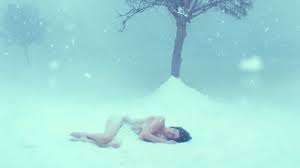This adaptation of Laura Kasischke’s young adult novel finds director Gregg Araki in less than full-on mode, and my first impression, such is the uncertainty of tone here, is that when he isn’t in full-on mode (eg: Nowhere, Kaboom) he doesn’t know what he’s doing.
But my first impression is wrong. Probably.
When I walked into the ICA Screen 2 a voice that could have been Werner Herzog’s said: ‘It’s filling up!’ This was a joke – I was the only person in the cinema apart from the Herzog soundalike and his friend, whereas the showing of Appropriate Behaviour in the same screen beforehand had sold out. A few more people appeared later, but there remained an indistinct feeling that we were either particularly discerning punters or had made a mistake.
It was an ambivalence that persisted as the film began, though surely it’s only right that a film about an adolescent should evoke confusion. Not that our heroine Kat (an impressive Shailene Woodley) is confused – outwardly, anyway. Certainly she thinks she’s got her parents taped – her mum (Eva Green) is stuck in a dull marriage and her dad (Christopher Meloni) is that dullness personified. Away from the home, she’s acquired a sex life with the dim but attractive boy next door (Shiloh Fernandez) and only her choice of somewhat generic misfit friends (gay boy and obese black girl) suggests that she isn’t quite the super-confident suburban teenager that she appears to be.
Then Mum disappears, which doesn’t exactly surprise Kat, who assumes she’s acquired a lover and run away from her boring husband. Flashbacks, however, tell a slightly different story. Here, she appears as an increasingly demonic figure, seething with jealousy for her daughter – whose life was just opening up while hers remained stifled – and making increasingly obvious overtures to her boyfriend. Eva Green seems to have stepped in from a camp horror film of the kind that might once have starred Joan Crawford, striking an awkward note in these more muted surroundings. But this awkwardness helps to dramatize the yawning chasm between Kat’s surface confidence and her inner insecurity.
Underneath it all, Kat’s identity is still forming and her mother represents a direct threat to it, as is made very plain when, in one of their heart-to-hearts, her Mum’s attempt at the phrase ‘When I was your age’ comes out as ‘When I was you.’ This is too intimate a threat to be consciously acknowledged, bringing with it the possibility of losing one’s self and becoming the titular white bird in a blizzard – undifferentiated, lost. So Kat merely shrugs off this Gothic apparition (whose exaggerated aspect itself suggests a teenager’s unreal concept of a parent) as she does her similiarly-caricatured – in all his stolid ordinariness – Dad.
There is a cruel irony at the heart of this film: the disappearance, even death, of Kat’s mother is almost a precondition to Kat’s becoming a whole person. It must be noted that she takes Mum’s sudden absence in her stride, even taking the opportunity to sleep with the investigating cop (Thomas Jane) who she has, by the by, identified as ‘the polar opposite’ of her meek father.
Which is not to say that her grief, when it comes, is insincere. But an ambiguity lingers as Kat comes to an accommodation with the memory of her mother that would not have been quite so easy with the real thing. The mystery of Mum’s disappearance is resolved in a banal manner that reveals Kat’s recurrent dreams of her mother in the snow as something of a sardonic joke – she’s (SPOILER ALERT) in the chest freezer in the basement. It was her Dad that put her there, after she found him in bed with Kat’s boyfriend and couldn’t stop laughing and he strangled her.
Dad, then, is not quite as meek and harmless as Kat’s narrative voice has painted him. Undermining that narrative, Araki emphasises the spaces between people in his compositions, and every now and again fades slowly to black in a way that suggests the lights going down on a failed performance. The mixture of the bold and the tentative in his approach might suggest that the film has an identity crisis, but if there is an identity crisis it’s surely Kat’s. Not that she’d own up to it, and why should she? If Kat’s identity is assembled from distortions and contradictions, lacunae and misunderstandings, then it’s no different from anyone else’s. Probably.


Recent Comments